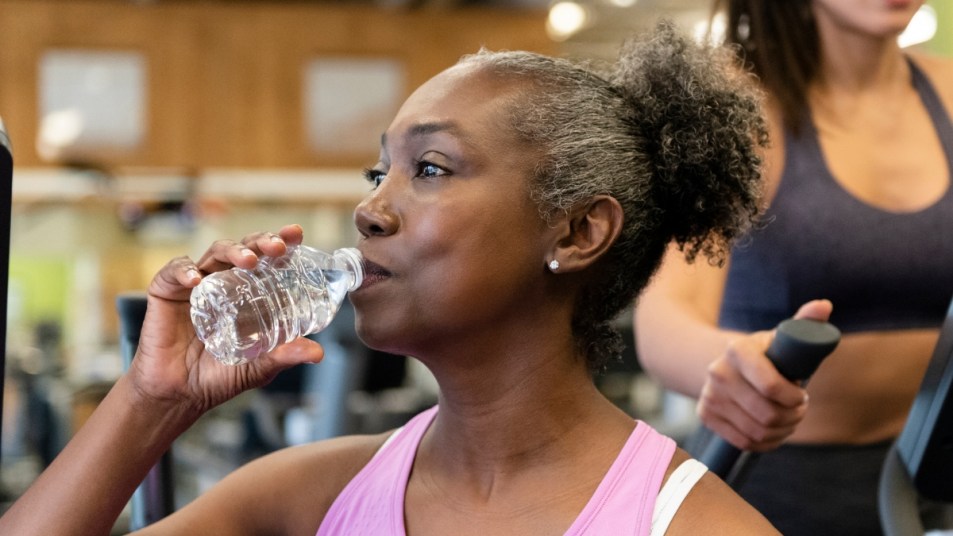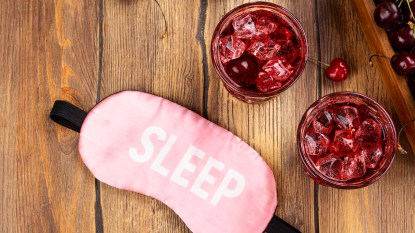You May Be Drinking Chemicals If You Leave Your Water Bottle in Your Car

Do you always have a bottled water on hand in your car? Many people do because of the convenience. It’s easy to grab a sip instead of having to pop into a store. Plus, buying bottles in bulk helps you avoid a hefty up-charge on individual ones. But besides the obvious environmental problems that single-use bottles cause, if you leave them in the heat of the backseat you may end up with chemicals in your water.
New research shows that plastic water bottles that have been left in the sun or extreme heat will break down and leach chemicals. What’s worse, the process accelerates as the temperature and time increase. A tell-tale sign that this has happened is when the water starts to taste like plastic.
Most plastic water bottles these days are made of polyethylene terephthalate (PET), a thermoplastic material. To check whether your water bottle was made with PET, look for a recycled icon printed into the plastic. “PET” is usually printed beneath it.
PET works well because it is flexible, clear, light, strong, and easily recycled. It also has a low melting point compared to other plastics and can therefore be reshaped multiple times with no changes to its chemical makeup.
However, that low melting point, which is about 500 degrees Fahrenheit, may be PET plastic’s downfall when it comes to leaching chemicals. A study published in the Journal of Environmental Pollution found that when water bottles made from PET are exposed to heat over a long period of time, they can release bisphenol A, more commonly known as BPA, the endocrine-disrupting chemical.
In another study published in Frontiers in Chemistry, researchers from the State University of New York tested 11 globally sourced brands of bottled water for microplastic contamination. They found that 93 percent of the 259 bottles tested were contaminated with microplastic particles. Those particles came from both the bottle cap materials and the water bottles themselves.
Even BPA-free water bottles leach chemicals. According to a study published in Environmental Health Perspectives and highlighted by NPR, many plastic products labeled BPA-free still leach chemicals that mimic estrogen. In fact, some BPA-free plastics had even more chemical activity than products containing BPA. The study was met with mixed reviews, as some scientists remarked that many edible foods act like estrogen. Others praised the study for adding more research to the topic.
It’s important to note that many of these studies did not test whether the chemicals leached from plastic are dangerous. The World Health Organization also explained in a statement that there isn’t enough data to prove that microplastics are harmful to our bodies. On the other hand, the organization noted that there isn’t enough evidence to prove that these chemicals are harmless, either. Companies including Aquafina, Nestle, and Dasani all disputed the study’s evidence, stating that the water they use must pass through high-quality filtration systems. Nestle added that it didn’t find microplastics beyond a trace level in its water bottles, which directly contradicted the study findings.
What’s the takeaway? If you still want to keep water in your car or in a spot that gets warm, try using a reusable bottle. Just keep in mind that the material of your reusable water bottles matters, too. A study from the Harvard School of Public Health (HSPH) found that participants who drank from polycarbonate bottles for a week experienced a two-thirds increase of BPA in their urine. The polycarbonate bottles they tested were hard plastic bottles, commonly used as sports water bottles, baby bottles, and sippy cups. Baby bottles that got heated in the microwave were particularly concerning to research authors, who worried that babies may be highly susceptible to BPA’s endocrine-disrupting capabilities.
So, what types of reusable water bottles should you use instead? Most water-bottle users recommend purchasing bottles made from food-grade stainless steel, silicone, or glass. Stainless steel bottles tend to be the most durable. Glass water bottles are of course breakable, but many brands offer rubber or silicone casings. Others are even insulated with a shatterproof shell, so the glass is contained in the unlikely event that it shatters.
Ultimately, drinking from a plastic water bottle every now and then won’t have detrimental effects on your health. Just remember to store those bottles outside your car, and you should be good to go.













